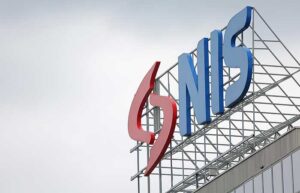
Given the energy situation in Ukraine, the warehouses of the state-owned enterprise ‘Forests of Ukraine’ have accumulated over 220,000 cubic metres of firewood, which is enough to provide for the social sector, the population and the military, the press service of the state-owned enterprise reported on Telegram.
‘The situation in the energy sector is extremely difficult. We have high hopes that Ukrainian cities will withstand it. But we are preparing for any scenario. (…) Procurement continues uninterrupted, and despite the extremely complicated logistics, the warehouses are constantly being replenished,’ the state-owned enterprise emphasised.
According to information from ‘Forests of Ukraine,’ despite prolonged power outages, there has been no significant increase in demand for firewood. Since the beginning of 2026, forestry enterprises across the country have sold only 15,000 cubic metres.
The state-owned enterprise emphasised that it considers fuel supplies to the Armed Forces of Ukraine to be no less of a priority, which are also being fulfilled in full in accordance with the terms of the contracts. If necessary, foresters are ready to increase supplies.
‘Forests of Ukraine’ assured that it would leave prices for social firewood unchanged until the end of the heating season and advised households to start thinking about the next season and replenish their stocks in advance.

Imports of goods to Ukraine in January-December 2025 amounted to $84.8 billion in monetary terms, while in the previous year this figure was 20% lower at $70.7 billion, according to data from the press service of the State Customs Service of Ukraine (SCS).
According to the publication, exports of goods, on the contrary, decreased from $41.6 billion in 2024 to $40.3 billion in 2025.
“Taxable imports amounted to $64.3 billion, which is 76% of the total volume of imported goods. The tax burden per 1 kg of taxed imports in January-December 2025 amounted to $0.52/kg,” the SCS noted in its report on trade turnover in 2025.
During 2025, the top three countries from which Ukraine imported the most goods remained almost unchanged: China – $19.2 billion, Poland – $7.9 billion, and Germany – $6.6 billion.
During the year, Ukraine exported the most to Poland – $5 billion, Turkey – $2.7 billion, and Germany – $2.4 billion.
In terms of the total volume of goods imported in 2025, the largest share was accounted for by machinery, equipment and transport – $34.1 billion (with customs clearance, UAH 207.8 billion was paid to the budget, or 29% of customs revenue), chemical industry products – $12.5 billion (97.8 billion hryvnia paid to the budget, accounting for 14% of customs revenue), fuel and energy – $10.5 billion (214.8 billion hryvnia paid, or 30% of customs revenue).
As in the previous year, the top three most exported goods from Ukraine were food products – $22.5 billion, metals and metal products – $4.7 billion, and machinery, equipment and transport – $3.6 billion.
The State Customs Service added that in January-December 2025, during customs clearance of exports of goods subject to export duties, UAH 1.53 billion was paid to the budget, which is significantly more than in 2024, when UAH 311.3 million was received by the budget.

In 2025, Ukrainian cities received 73 trams, which is 29% or 30 vehicles less than in 2024, according to AllTransUA.
‘The tram market in 2025 declined slightly compared to 2023 and 2024, but it still relied on the acquisition of used cars,’ the website said.
According to AllTransUA, of the 73 tram cars received last year, 58 were used cars and 15 were new, purchased with budget funds and as part of cooperation with international financial organisations (IFOs).
The lion’s share of used trams were Swiss carriages, which were received as aid by Lviv and Vinnytsia.
‘While the carriages received by Lviv already have accessible entrances, Vinnytsia will receive fully high-floor carriages, which it will equip with a low-floor section on its own, based on a project used in Zurich,’ the website reports.
Kharkiv received another 10 used Tatra carriages and their modernisation.
All new carriages in 2025 were manufactured by Tatra-Yug (the carriages are assembled at the Pivdenmash plant in Dnipro – IF-U). In particular, last year the company completed the delivery of K1T306 carriages for Odesa (seven carriages funded by the IMF) and delivered eight carriages to Kyiv using budget funds.
‘It is interesting that this year’s batch of carriages for Kyiv differs from the previous one in terms of door configuration, so there are now three known variants of K1T306,’ notes AllTransUA.
At the same time, in 2025, the last tram system in the controlled part of the Donetsk region in Druzhkivka was closed. The report explains that as a result of Russian shelling, the tram’s power system was significantly damaged, and given the slow approach of the front line, it was decided not to restore it.
‘This year, the supply of trams will continue under existing agreements within the framework of cooperation with international financial organisations, in particular for Dnipro and Kamyanske. In addition, Lviv will complete the receipt of used Schindler carriages,’ AllTransUA reminds us.
According to the data provided, from 2012 to 2020, Ukrainian cities were supplied with mostly used tram cars and new ones purchased with budget funds – the largest number of which was received in 2017 – 156 units (113 of which were used).
Last year, out of 103 carriages, cities received 12 new ones (funded by the IMF), 65 used ones (received as aid), and 26 used ones purchased with budget funds.

According to Serbian Economist, Serbian oil and gas company NIS has announced the signing of a contract to import the first batches of oil via the Adriatic oil pipeline (JANAF) for the refinery in Pančevo and preparations to resume processing after a shutdown in early December 2025 due to a shortage of raw materials amid sanctions restrictions.
According to Reuters, the first shipment includes about 85,000 tonnes of Iraqi Kirkuk oil, followed by a smaller batch of Libyan Es Sider. These volumes will keep the plant running for at least a few days, and Serbian President Aleksandar Vučić has predicted that the refinery will be able to resume operations on 17-18 January, with the production of petroleum products likely to begin on 25-26 January.
The resumption of imports became possible after the US Treasury’s Office of Foreign Assets Control (OFAC) issued a temporary licence allowing NIS to continue operating until 23 January 2026. Reuters also reported that a separate licence had been issued to the operator JANAF to transport oil for NIS for the same period.
The situation surrounding NIS remains linked to negotiations on changes to its ownership structure. The US is awaiting negotiations on the withdrawal of the Russian share, with the deadline for the negotiation process extended to 24 March 2026, and Hungarian company MOL is named as one of the participants in the discussions.
NIS is a key player in the Serbian fuel market: the company owns the country’s only oil refinery (Pančevo) and the largest network of petrol stations, so any disruption in the supply of raw materials directly affects the balance of the petroleum products market and Serbia’s import needs.

Global investments in the construction of data centres will total at least $3 trillion by 2030, according to analysts at the international rating agency Moody’s Ratings.
This amount includes investments in the purchase of servers, computing equipment, the creation of the necessary infrastructure, and the provision of power supply.
The bulk of the costs will be borne directly by large IT companies. This year alone, six leading American companies providing computing services will spend $500 billion on data centres, according to Moody’s report. These include Microsoft Corp., Amazon.com Inc., Alphabet Inc., Oracle Corp., CoreWeave Inc. and Meta.
Banks will continue to play an important role in providing financing to the industry, while other institutional investors will also provide companies with funds to expand their data centre capacity, experts say.
According to a report by investment company Colliers, data centres accounted for 31% of total investment in private real estate construction in the first three quarters of 2025. The average figure since 2020 has been around 15%.

The National Bank of Ukraine (NBU) increased dollar sales on the interbank market by $79.0 million, or 12.5%, to $712.1 million last week, according to statistics on the regulator’s website.
According to the NBU, during the first four days of last week, the average daily negative balance of currency purchases and sales by legal entities decreased to $67.3 million from $69.3 million during the same period a week earlier, totaling $269.3 million.
On the currency exchange market for the population, on the contrary, the negative balance increased to $46.5 million from $21.9 million the week before last, and on all days, the purchase of non-cash currency exceeded its sale.
The official hryvnia-to-dollar exchange rate, which started last week at 42.2942 UAH/USD, weakened daily to a new historic low, broke through the 43 UAH/USD level, and ended the week at 43.0757 UAH/USD.
The hryvnia’s exchange rate against the euro also fell by 1.1% over the week, from 49.5794 UAH/EUR1 to 50.1444 UAH/EUR1. During these days, it also broke through the important level of 50 UAH/EUR1 for the first time and reached a historic low of 50.1762/EUR1.
On the cash market, the dollar exchange rate over the past week followed the official trajectory, with the dollar rising by approximately 77 kopecks over the week: purchase – to 42.84 UAH/$1, sale – to 43.26 UAH/$1, while on the black market on Monday it reached 43.4-43.5 UAH/$1, with the euro also rising in price by 80 kopecks and currently trading at: purchase – 50 UAH/EUR11, sale – 50.73 UAH/EUR1.